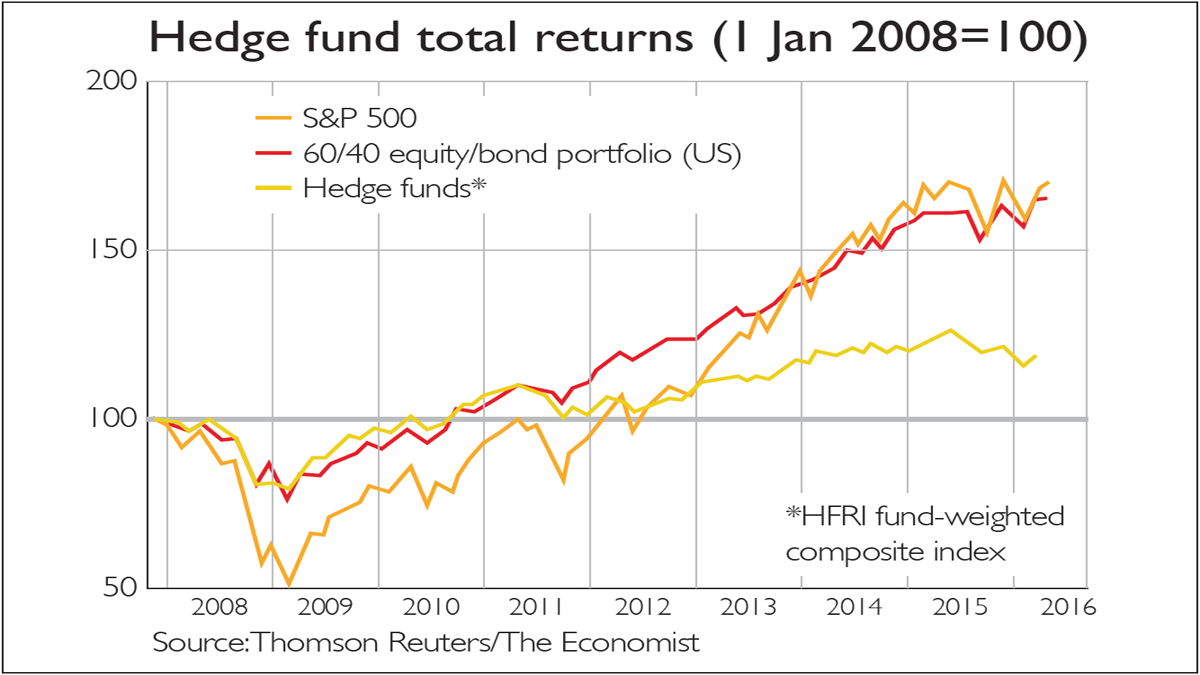A catastrophic time for hedgies
Hedge funds charge high fees because they employ the best people. That story is getting ever harder to believe, says Sarah Moore.
Get the latest financial news, insights and expert analysis from our award-winning MoneyWeek team, to help you understand what really matters when it comes to your finances.
You are now subscribed
Your newsletter sign-up was successful
Want to add more newsletters?

Twice daily
MoneyWeek
Get the latest financial news, insights and expert analysis from our award-winning MoneyWeek team, to help you understand what really matters when it comes to your finances.

Four times a week
Look After My Bills
Sign up to our free money-saving newsletter, filled with the latest news and expert advice to help you find the best tips and deals for managing your bills. Start saving today!

"Hedge funds employ the cleverest people in the world to exploit the opportunities that other managers miss," says the Buttonwood columnist in The Economist. "That is why they deserve their high fees or so the story goes. That story is getting harder and harder to believe."
In the first quarter of 2016, the average hedge fund lost 0.8% after fees, according to index provider Hedge Fund Research (HFR). That's after losing 1.1% in 2015 and gaining 3% in 2014. The average investor has earned just 1% since the beginning of 2014, while the S&P 500 has gone up by 12% over the same period.
What's happened? The hedge-fund industry has become a "victim of its own popularity", say David Randall, Svea Herbst-Bayliss and Lawrence Delevingne on Reuters.com. There are now more than 10,000 global hedge funds and funds of hedge funds, all trying to make money in a world of low rates and limited opportunities, with predictable results.
MoneyWeek
Subscribe to MoneyWeek today and get your first six magazine issues absolutely FREE

Sign up to Money Morning
Don't miss the latest investment and personal finances news, market analysis, plus money-saving tips with our free twice-daily newsletter
Don't miss the latest investment and personal finances news, market analysis, plus money-saving tips with our free twice-daily newsletter
"Many managers are chasing the same ideas lowering potential returns."Hence the first quarter of 2016 has been "one of the most catastrophic periods of hedge-fund performance that we can remember," says Daniel Loeb, manager of the $17.5bn Third Point hedge fund in a recent letter to investors.
This was due both to market swings driven by news on the Chinese economy, and to ill-fated bets on many stocks where hedge funds have had big positions, such as Facebook, Netflix, Valeant and Allergan. This run of poor returns comes at a time when "institutions such as pension funds are questioning the value of investing in hedge funds", say Mary Childs and Stephen Foley in the Financial Times. Some are already heading for the exit: investors withdrew $15.1bn from hedge funds in the first quarter of 2016, according to HFR. If returns don't improve, outflows will continue.
Rightly so, given that the long-term case for hedge funds looks decidedlyshaky, notes Buttonwood. Back in 2008, Warren Buffett bet hedge-fund manager Ted Seides $1m that a Vanguard S&P index fund would beat a portfolio of hedge funds over ten years. The S&P 500 is currently up 65.7% since 2008 (see chart). A simple 60/40 stock/bond portfolio has had similar returns with less volatility.
The average hedge fund is up by just 21.9% (see chart). Unless something drastic happens in the next 19 months, Buffett "seems almost certain to collect", says Buttonwood. Regrettably, hedge-fund investors won't do so well.
Get the latest financial news, insights and expert analysis from our award-winning MoneyWeek team, to help you understand what really matters when it comes to your finances.
Sarah was MoneyWeek's investment editor. She graduated from the University of Southampton with a BA in English and History, before going on to complete a graduate diploma in law at the College of Law in Guildford. She joined MoneyWeek in 2014 and writes on funds, personal finance, pensions and property.
-
 Should you buy an active ETF?
Should you buy an active ETF?ETFs are often mischaracterised as passive products, but they can be a convenient way to add active management to your portfolio
-
 Power up your pension before 5 April – easy ways to save before the tax year end
Power up your pension before 5 April – easy ways to save before the tax year endWith the end of the tax year looming, pension savers currently have a window to review and maximise what’s going into their retirement funds – we look at how